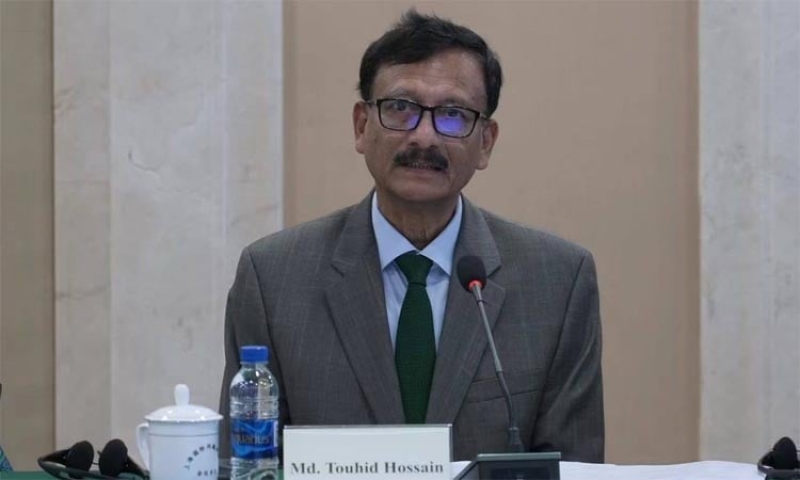- Trump considering military options on Greenland; Europe rejects |
- Fertiliser crunch threatens Kushtia’s onion boom despite high prices |
- Security Council Divided on United States' Venezuela Action |
- Over 1.53m voters register for postal balloting: Shafiqul Alam |
- Bangladesh Bank to liquidate 9 NBFIs in financial sector reforms |
Touhid Calls for Narrowing Trade Gap with China

Visiting Foreign Affairs Adviser Md. Touhid Hossain delivered a keynote address at a seminar in the Shanghai Institutes for International Studies (SIIS). Photo: MoFA
Foreign Affairs Adviser Md Touhid Hossain, currently on an official visit to China, emphasized the need to narrow the trade gap and boost regional connectivity with China to promote equitable and sustainable growth. He made these remarks during a keynote address at the seminar titled “Our Shared Vision for Peace, Stability, and Prosperity” at the Shanghai Institutes for International Studies (SIIS) in Shanghai, according to a press release from the Ministry of Foreign Affairs.
In his address, Hossain outlined a forward-looking vision for global peace, underscoring the critical role of economic cooperation as the foundation for sustainable development and stability. He noted that global challenges, such as peace and security, require collective action, inclusive economic frameworks, and a stronger focus on empowering marginalized groups, particularly youth and women.
Regarding the Rohingya crisis, Hossain called for a conducive environment in Rakhine State to facilitate the return of the Rohingya refugees. “Both Bangladesh and China have a vested interest in resolving the conflict, and we must collaborate fully to bring about a lasting resolution,” he stated.
The Adviser also highlighted the historical ties between Bangladesh and China, which date back to ancient times, and emphasized the transformation of their relationship into a dynamic partnership through various mechanisms, including the Belt and Road Initiative (BRI). He praised China's development assistance and investments in Bangladesh, noting their significant contributions to the country’s socio-economic progress.
Hossain also pointed to Bangladesh’s successful social initiatives, such as microcredit programs pioneered by Nobel Laureate Professor Muhammad Yunus, which have empowered rural women and fostered social cohesion. He called for similar transformative efforts to support the youth and ensure their future participation in economic development.
To achieve the shared vision for regional and global prosperity, Hossain stressed the importance of strengthening multilateral institutions, expanding investments, and fostering deeper people-to-people exchanges. He also advocated for a robust global trading system that promotes fairness and inclusivity.
The seminar began with a welcome address by Dr. Chen Dongxiao, President of SIIS, who highlighted the growing partnership between Bangladesh and China. Dr. Chen expressed optimism that the event would contribute to enhancing academic and research collaboration between the two nations, furthering global peace and stability.
The event was attended by a distinguished audience, including scholars, diplomats, government officials, young researchers, media representatives, and experts from SIIS. Presentations by key participants, including Dr. Yang Jiemian, Director of the Academic Advisory Board at SIIS, sparked vibrant discussions on topics ranging from economic globalization to regional stability. The session concluded with closing remarks by Bangladesh’s Ambassador to China, Md. Nazmul Islam.
This event reflects the strengthening ties between China and Bangladesh, particularly in the areas of economic cooperation, regional stability, and shared commitment to global peace and prosperity.

